|
|
|
Sort Order |
|
|
|
Items / Page
|
|
|
|
|
|
|
| Srl | Item |
| 1 |
ID:
113812


|
|
|
|
|
| Publication |
2012.
|
| Summary/Abstract |
Over recent decades a judicialization process of international dispute settlement procedures has taken place. Yet, the judicialization of procedures remains meaningless if the procedures are not used and accepted by disputing states in practice. Prominent theoretical approaches point to different conditions under which this is to be expected. Realism emphasizes the international distribution of power, institutionalism stresses the importance of the institutional design of international dispute settlement procedures, and liberalism points to the domestic institutional setting of the participating states. The article confronts these theoretical expectations with states' actual dispute settlement behavior in the international trade regime, the United Nations Security Council, the European human rights regime and the regime on the protection of endangered species in the 1970s/80s and 1990s/2000s, respectively. Its main finding is that, compared to realism and liberalism, institutionalism fares better in explaining the judicialization of states' dispute settlement behavior.
|
|
|
|
|
|
|
|
|
|
|
|
|
|
|
|
| 2 |
ID:
113808
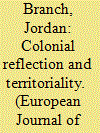

|
|
|
|
|
| Publication |
2012.
|
| Summary/Abstract |
The modern international system is commonly argued to have originated within Western Europe and spread globally during centuries of colonialism. This article argues, instead, that the character of the modern system of territorially sovereign states resulted from a complex interaction between European colonizing polities and events, actors, and spaces in other parts of the globe. In particular, through a process of colonial reflection, many of the foundational ideas and practices of modern statehood were formed in the interactions of Europeans with the unknown, supposedly empty, spaces of the New World in the 16th and 17th centuries. These novel practices were applied only later to politics among states in Europe. Most important among these developments is the ideal of territorial exclusivity as the sole basis for state sovereignty. This analysis also has implications for the study of contemporary international systemic change.
|
|
|
|
|
|
|
|
|
|
|
|
|
|
|
|
| 3 |
ID:
113805
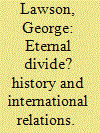

|
|
|
|
|
| Publication |
2012.
|
| Summary/Abstract |
On one level, history is used by all parts of the International Relations (IR) discipline. But lurking beneath the surface of IR's approach to history lies a well-entrenched binary. Whereas mainstream positions use history as a means to fill in their theoretical frames (seeing history as a kind of 'scripture' of abstract lessons), many post-positivists reduce history to a pick-and-mix of contingent hiccups (a 'butterfly' of what-ifs and maybes). Interestingly enough, this binary is one reproduced throughout the social sciences. As such, there is a bigger story to the apparently 'eternal divide' between history and social science than first meets the eye. This article uses the various ways in which history is used - and abused - in IR to probe more deeply into the relationship between history and social science as a whole. This exploration reveals four frameworks, two drawn from history (context and narrative) and two drawn from social science (eventfulness and ideal-typification) which illustrate the necessary co-implication of the two enterprises. The article employs these tools as a means of re-imagining the relationship between history and social science (including IR), conceiving this as a single intellectual journey in which both are permanently in view.
|
|
|
|
|
|
|
|
|
|
|
|
|
|
|
|
| 4 |
ID:
113809
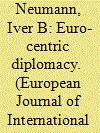

|
|
|
|
|
| Publication |
2012.
|
| Summary/Abstract |
Drawing on the work of cultural anthropologists Clifford Geertz and Marshall Sahlins, I suggest a layered conceptualization of diplomacy as consisting of myths, sociabilities and practices which allows us to open the question of diplomacy's Euro-centrism to empirical scrutiny. As do all known diplomatic systems, European diplomacy has its roots in the social systems of kinship and religion. It is rooted in Christian mythology, and this mythology informs its sociabilities and practices. Three mini-case studies (of diplomatic immunity, permanent representation and the institution of dean of the corps diplomatique) demonstrate that this mythology shines through in present-day diplomacy as well. Since diplomatic practices bear the mark of a European cultural context, it privileges the life chances of those native to that context. In this sense, diplomacy is Euro-centric. I then go on to argue that, empirically, this does not seem to be a particularly pressing problem. The real problem may be external to diplomacy itself, and concern the idea that European diplomacy was uniquely peaceful. As I demonstrate by means of a mini-study of Iroquois diplomacy, this is simply not the case. If the erroneous idea of uniquely peaceful European diplomacy is paired up with a framing of relations between European and non-European polities in terms of peaceful diplomacy, the result may easily be that we occlude other aspects of those relations, such as conquest and colonialization. The Euro-centrism of diplomacy that matters is thus less to do with diplomatic practices than with mnemonic practices about diplomacy.
|
|
|
|
|
|
|
|
|
|
|
|
|
|
|
|
| 5 |
ID:
113810
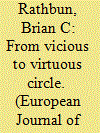

|
|
|
|
|
| Publication |
2012.
|
| Summary/Abstract |
Constructivists maintain that a shared identity was crucial for explaining the creation of the North Atlantic Treaty Organization and the multilateral form that it took. I challenge this view, arguing instead that the alliance was based on moralistic trust, the belief that others will live up to their moral obligations. Moralistic trust facilitates the initiation of cooperation, so that states can begin a virtuous circle of trust, collaboration, and enhanced trust. It is also the foundation of the diffuse reciprocity inherent to multilateralism. In two case studies of the domestic politics in the United States of making a multilateral security commitment to Europe, the first being the League of Nations, I demonstrate that identity was not a prominent consideration and did not lead individuals to embrace multilateralism. This social-psychological account improves upon constructivism and rationalism by offering a way to embed ideational variables in studies of strategic interaction.
|
|
|
|
|
|
|
|
|
|
|
|
|
|
|
|
| 6 |
ID:
113807


|
|
|
|
|
| Publication |
2012.
|
| Summary/Abstract |
This article develops a model for analysing international regime formation in the environmental domain. It is argued that current approaches to understanding how regimes emerge and develop are too narrow, and fail to account for the dynamic interplay between states and markets which induce the emergence of 'tipping points' leading to more extensive and stringent international institutions. The article demonstrates the central role of tipping points in regime formation using the example of international climate change.
|
|
|
|
|
|
|
|
|
|
|
|
|
|
|
|
| 7 |
ID:
113811
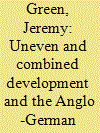

|
|
|
|
|
| Publication |
2012.
|
| Summary/Abstract |
This article attempts to situate the approach to World War I within the context of the uneven and combined development of 19th-century European capitalism. Through a comparative analysis of German and British development within the context of the epochal transition from feudalism to capitalism, the article proposes that existing historical materialist and Realist understandings of the roots of World War 1 are inadequate. Realist analyses, stressing the primacy of 'geopolitics', fail to provide a convincing explanation of the precise origins of German bellicosity. Instead they assume that expansionist German behaviour was an inevitable consequence of systemic anarchy. Historical materialist accounts, preferring a sociological explanation, overstate the importance of systemic capitalist crisis and the European-wide escalation of class struggle for understanding the genesis of the war. Utilizing Trotsky's concept of uneven and combined development, I contend, enables a more comprehensive understanding of the origins of the conflict.
|
|
|
|
|
|
|
|
|
|
|
|
|
|
|
|
| 8 |
ID:
113806
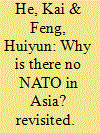

|
|
|
|
|
| Publication |
2012.
|
| Summary/Abstract |
Why did the US prefer multilateral alliances in Europe, but bilateral alliances in Asia after World War II? Rationalists and constructivists debate the impact of power, institutions, and identities in explaining this highly contested question. We introduce a new argument embedded in prospect theory from political psychology - a prospect-threat alliance model - to account for the variation in US alliance strategy toward Europe and Asia after World War II. Through setting the threat level as a reference point for leaders' prospects of gains or losses, we suggest: (1) high threats frame decision-makers in a domain of losses, and multilateral alliances become a favorable alliance choice because states are more likely to take the risk of constraining their freedom of action in return for more help from multiple allies as well as for avoiding further strategic losses; (2) low threats position leaders in a domain of gains, and bilateral alliances win out because states are risk-averse in terms of maintaining their freedom of action in seeking security through alliances with fewer allies. US alliance policy toward Asia after World War II is a within-case analysis that tests the validity of the prospect-threat alliance model.
|
|
|
|
|
|
|
|
|
|
|
|
|
|
|
|
|
|
|
|
|